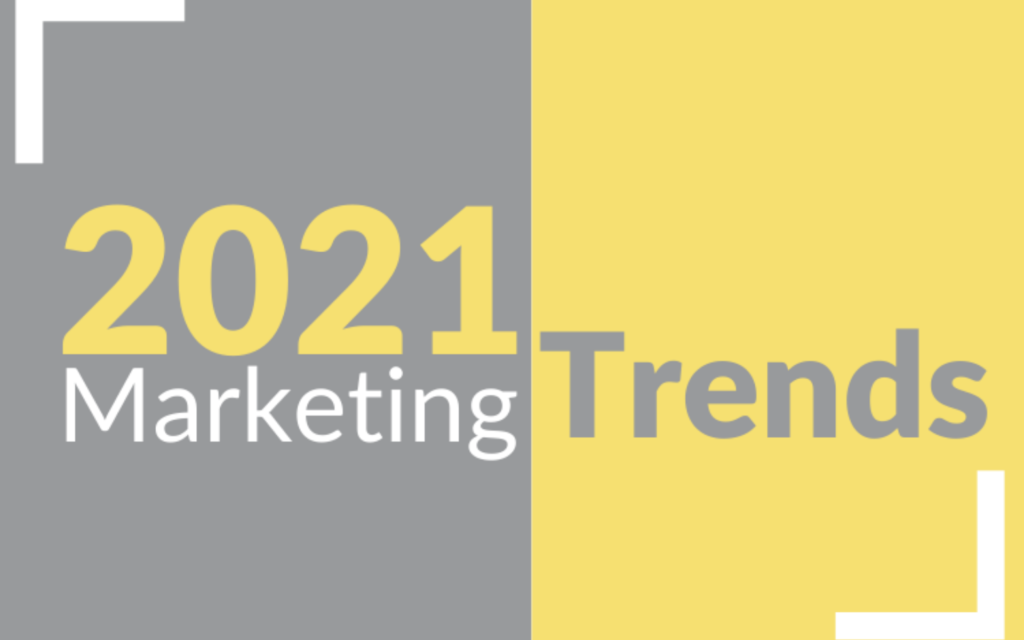Insights On The Top Marketing Trends For 2021


Insights On The Top Marketing Trends For 2021
As the Covid-19 pandemic decimated the global economy, this year has seen unprecedented changes. As uncertainty made it difficult to plan for the future, significant shifts were observed in consumer spending. Online services were made possible by lockdowns, which forced many people to use them for entertainment, shopping, and other purposes. These changes have created new marketing trends.
Factors That Affect Marketing Trends and Responses
Internal elements
A company’s marketing strategy can be affected by all the essential aspects, including finance and production. One example is a business that has a low marketing budget might not use multiple channels to reach more people.
External elements
Four factors influence marketing trends and how companies should respond to them:
1. The Economy
Because the economy affects consumer consumption, it helps to shape marketing trends. Expansion, peak, contraction, and trough are four phases of the economic cycle. They all significantly affect products, marketing campaigns, and prices.
2. Competition
Marketing trends and strategies can be affected by the presence of competitors who offer similar products and services. Competition is a significant business problem. Still, it can also be used to strategically plan your marketing campaign so you can outperform your competition.
3. Demographics
Demographics are an essential part of an organization’s marketing strategy. Customer spending habits can be significantly affected by age, gender, race, income, marital status, or even marital status.
4. Sociocultural Factors
Marketing trends are influenced by sociocultural factors. Which means that different campaigns may be required. These sociocultural factors can be leveraged to establish a relationship with customers and encourage their consumption.
The Top Trends in Marketing for 2021
Now is the moment of truth. Deloitte has identified 2021 as the top global marketing trend. These are my thoughts based on the directions I have seen in the marketing industry.
Defining And Highlighting Purpose
Businesses that are clear about their purpose, who they serve, and why they exist have succeeded in navigating these uncertain times. CMOs who know their company’s purpose and how to highlight it are driving this navigation when many businesses are chasing to find their feet.
Burger King recently asked people to place orders from its biggest competitor. Nike similarly announced that it was giving merchandise of $5.5 million to frontline healthcare workers. Reebok, Adidas, and Timberland were also among the major brands that donated their merchandise to Sneakers for Heroes. This is a program to provide healthcare workers with comfortable shoes. I have seen many CMOs take note of these marketing strategies and believe that many more will adopt a same approach in the future.
Achieving Agility
Agile marketing is not just a good strategy for now, but it’s also a survival strategy. Marketing professionals who demonstrated agility in the face of the pandemic run successful campaigns. Nike’s Play Inside, Play for the World Campaign is an excellent example of an agile marketing campaign. The company used its digital ecosystem to encourage social distancing throughout the pandemic. I believe similar agile marketing campaigns will be more common in the future.
Making Human Contacts
The pandemic was a success story for businesses that focused on genuine connections rather than on the efficiency and speed of the market. Carter’s children’s clothing brand launched a family-oriented campaign called “Stay at Home & Make Memories.” It featured Carter’s employees and their kids. The ad emphasized the importance of spending quality time with loved ones and friends. The brand pledged to donate $ one million of products to aid families affected by this pandemic. Harvard Business Review reports that “emotionally connected customers” are more valuable than delighted customers. They are more loyal and purchase more at lower prices. These types of practices are expected to increase in popularity next year.
Building Trust
E-commerce grew this year as more people stayed home. E-commerce companies may be in a position to sustain this growth, even though it is purely circumstantial. As they have proven successful, trust-building strategies like testimonials from customers will be a popular choice for next year.
Increasing Customer Participation
The future of customer participation goes beyond writing reviews online, joining discussions, or suggesting products or services to other customers. Businesses that increase customer engagement are likely to run more successful marketing programs. This strategy is based primarily on the timely creation and sharing of relevant content. Companies can also use advanced technology to personalize customer content and improve customer engagement.
Creating Innovative Partnerships
It is possible to benefit from innovative business partnerships, even though it is not a good business strategy. Ford partnered up with 3M, United Auto Workers, and GE Healthcare to make ventilators for Covid-19 patients. Similarly, Siemens AG. To help those interested in producing medical equipment, the Additive Manufacturing Network was opened. These partnerships are usually well-received, and I expect we will see more of this type of partnership next year.
Talent Transforming
Due to the pandemic, many marketing teams have developed new talent models. People who are successful at this can be distinguished from their Competition. I have seen new talent models that focus on earned and owned media and data insights and dynamic content production.
A Lesson For All
Although trust and brand loyalty are interrelated, they are becoming more critical in these uncertain times. Consumers expect brands to navigate through tough times without losing their cool. Failure to impact and influence people is a sign of a weak executive. This will not help you gain customer confidence. Brands and executives that responded positively in the face of the pandemic increased brand loyalty and gained consumer trust. The pandemic affected consumer confidence and concerned executives’ belief in their ability to act. If you align yourself with the above marketing trends, you will be better placed to run successful marketing campaigns.

